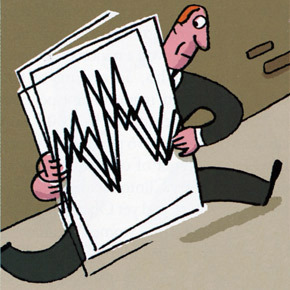John Cassidy's Blog, page 51
June 11, 2014
Brat’s Win Isn’t Just About the Tea Party

Private Eye, the English satirical magazine, has a make-believe columnist named Dave Spart. He’s a long-haired, mustachioed college lecturer and trades-union activist of Trotskyite inclinations, who’s forever fulminating about cuts in government spending, American foreign policy, and other iniquities. According to legend, Richard Ingrams, the magazine’s editor of many years, created the Spart character based on the views of one of Private Eye’s real-life contributors, the late Paul Foot, a dogged left-wing investigative journalist who was the nephew of Michael Foot, the sometime leader of the Labour Party.
These days, at least in the United States, radicals tend to be located on the other end of the political spectrum, and most of them are cleanly shaven. Enter Dave Brat, a forty-nine-year-old economist at Randolph-Macon College, a small but reputable liberal arts institution in Ashland, Virginia, who on Tuesday defeated Eric Cantor, the reptilian House Majority Leader, in a Republican primary election in Virginia’s seventh congressional district. As news of Bart’s victory came in last night, he was widely portrayed as a right-wing version of Spart—a Tea Party-endorsed, Ayn Rand-spouting, American enragé.
June 10, 2014
Cantor Loses, and Washington Goes Ape

Shortly after eight on Tuesday night, Twitter went a little nuts, and so, presumably, did Eric Cantor, the second-ranking Republican in the House of Representatives. The Associated Press, CNN, and other news organizations had just called the Republican primary race in Virginia’s Seventh District for David Brat, a hitherto little-known economics professor who is associated with the Tea Party wing of the G.O.P. Cantor had become the first House Majority Leader to lose a primary renomination.
All over Washington, commentators were called out of dinner; Fox News broke into the O’Reilly Factor; and political reporters struggled to come up with a correct historical analogy. Since virtually no one—or, at least, no one in the world of political forecasting and punditry—had predicted Brat’s victory, it would be presumptuous, at this stage, to say anything definitive about its causes or its consequences. But here are a few things that can’t easily be contested.
...read moreHillary Takes New York—or Union Square, Anyway

By the time I got to the Barnes & Noble in Union Square, at shortly after 9 A.M. on Tuesday, the line for Hillary Clinton’s 11 A.M. book signing stretched around the corner, up Park Avenue South, and down Eighteenth Street. (Apparently, some of the people up front had slept on the sidewalk to get a good place.) Having speculated about Hillary’s goals in publishing a second memoir, “Hard Choices,” which covers her four years as Secretary of State, I was keen to get hold of a copy, and also to witness the former First Lady, Senator for New York, and Secretary of State’s reëntry into retail politics, carefully staged as it would undoubtedly be.
June 9, 2014
Hillary’s Six Book Goals

For much of the world’s population, this is World Cup week. But for we twisted souls who follow politics more closely than sports, it’s Hillary Week—the moment at which the publication of her new memoir, “Hard Choices,” an account of her four years as Secretary of State, returns her to the media spotlight, and … well, that’s where things get a little murky.
What exactly are Clinton’s goals in inflicting on the American public a six-hundred-and-thirty-five-page tome devoted, largely, to the intricacies of diplomacy?
...read moreJune 6, 2014
The Great Deleveraging: Six And A Half Lost Years

Friday’s jobs report came in much as expected: payrolls rose by two hundred and seventeen thousand in May, and the unemployment rate remained steady at 6.3 per cent. That confirms what we already knew: following a weather-related hiccup in the first three months of the year, the economy is once again growing at a modest pace.
The big news in the report was that finally, almost five years after the Great Recession officially ended, the over-all number of jobs in the economy has returned to where it was before the slump began. In January, 2008, two months before Bear Stearns almost collapsed and had to be rescued, 138,365,000 people were employed in the non-farm economy. By February, 2010, the employment figure had fallen to 129,655,000—roughly 8.7 million jobs had been lost. Only now have they all been regained. The payrolls figure in May was 138,463,000.
June 5, 2014
Saving Sergeant Bergdahl: Unanswered Questions

Speaking in Brussels on Thursday, President Obama defended his decision to swap five aging Taliban prisoners, who were being held at Guantanamo Bay, for Sergeant Bowe Bergdahl, saying, “I think it was important for people to understand that this is not some abstraction, this is not some political football. You have a couple of parents whose kid volunteered to fight in a distant land, who they hadn’t seen in five years, and weren’t sure whether they’d ever see again.… I make absolutely no apologies for making sure that we get back a young man to his parents, and that the American people understand that this is somebody’s child, and that we don’t condition whether or not we make the effort to try and get them back.”
It was a forceful statement. But if the White House is hoping it will calm the controversy in Washington over the prisoner exchange, it will surely be disappointed. Obama’s Republican critics are still piling on, and the Democrats, with a few conspicuous exceptions, such as Senator Harry Reid, are keeping quiet or registering some doubts of their own. After a classified briefing for senators and congressmen on Wednesday evening at the Capitol, Senator Joe Manchin, of West Virginia, left visibly angry, according to a report in the Times, and said, “I think we can all agree we’re not dealing with a war hero here.”
June 3, 2014
Stop the World: It’s the World Cup

Memo to the leaders of Russia, China, Pakistan, Sudan, and any other country that has designs on recapturing disputed regions, islands, or principalities: If you are planning on some unwise military action, late next week would be a good time to have your forces nip in unnoticed. If you schedule your incursion for late afternoon, Eastern Standard Time, on Thursday, June 12th, you can rest assured that the eyes of the world will be elsewhere—focussed on the brand-new Arena de São Paulo, where Brazil will play Croatia in the first game of the World Cup.
...read moreJune 2, 2014
Obama’s “War on Coal” Is Worth Fighting

The Obama Administration’s decision to force the nation’s power plants to reduce their carbon emissions by about a third over the next decade and a half is overdue but welcome. For the past twenty years, the United States has been talking about tackling climate change, but, relative to some other advanced countries, its actions have been timid and insufficient. If the new Environmental Protection Agency regulations survive the inevitable challenges they will face in Congress and in the courts, the United States will finally start to live up to its verbal commitments. That by itself won’t stop climate change, but it could open the way to a truly meaningful international effort.
May 30, 2014
Why Obama Should Have Stuck with Shinseki

As Eric Shinseki, the Secretary of Veterans Affairs, apologized for the problems at his agency on Friday morning, a few hours before he resigned, he must have known that his days were probably numbered. Following the publication of an interim inspector general’s report showing that officials throughout the V.A. system falsified records about how long patients were waiting to see doctors, Republicans and Democrats on Capitol Hill had been calling for his resignation. White House Press Secretary Jay Carney, at his daily press conference on Thursday, had repeatedly refused to say that President Barack Obama still had confidence in Shinseki. On Friday, after meeting with Shinseki, the President said that he had, “with regret,” accepted his resignation, adding, “He does not want to be a distraction.”
...read moreMay 29, 2014
Blame the Gun Laws, Not Judd Apatow

After the gun massacre comes the blame game. It was Hollywood’s fault. Social media is responsible. It’s an issue of mental illness. Or suburban anomie. Or, in this case, male adolescent misogyny and sexual frustration taken to the extreme.
From Columbine to Newtown to Isla Vista, we’ve seen this narrative play out many times, and one understands the desire to cover all the angles and search for something new. After all, it gets a bit boring and repetitive to state what is, nonetheless, blindingly obvious: it’s not Judd Apatow or “Neighbors,” the new frat-boy movie. It’s not the Internet or the “manosphere.” It’s not anomie or misogyny, or too much sex, or too little, or anything else having to do with the dreadful but familiar pathologies of male adolescence and post-adolescence. It’s American gun laws.
...read moreJohn Cassidy's Blog
- John Cassidy's profile
- 56 followers



